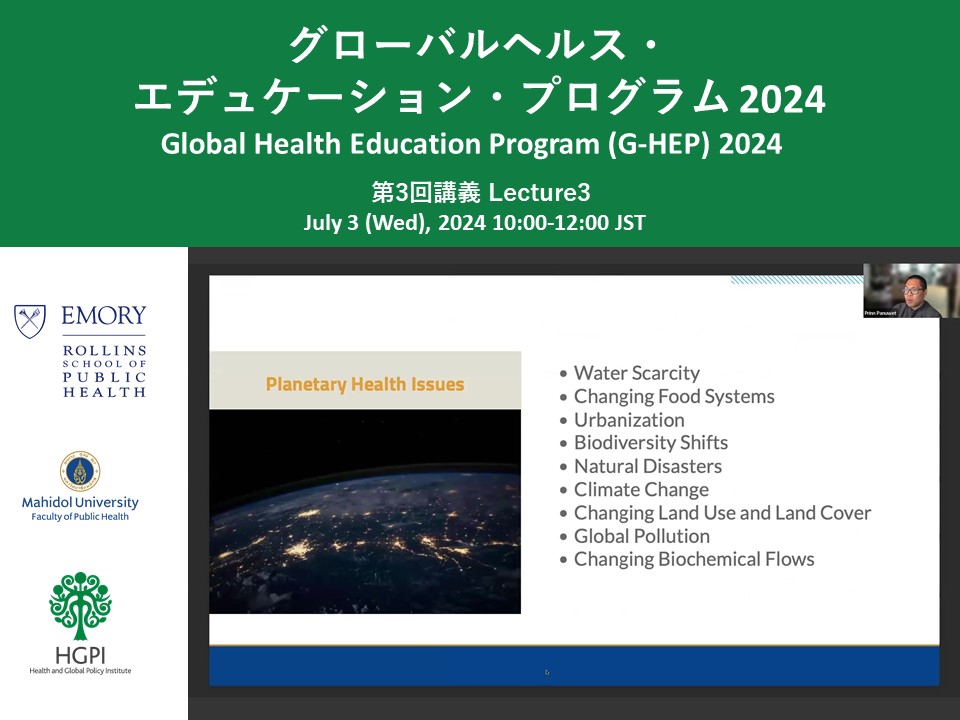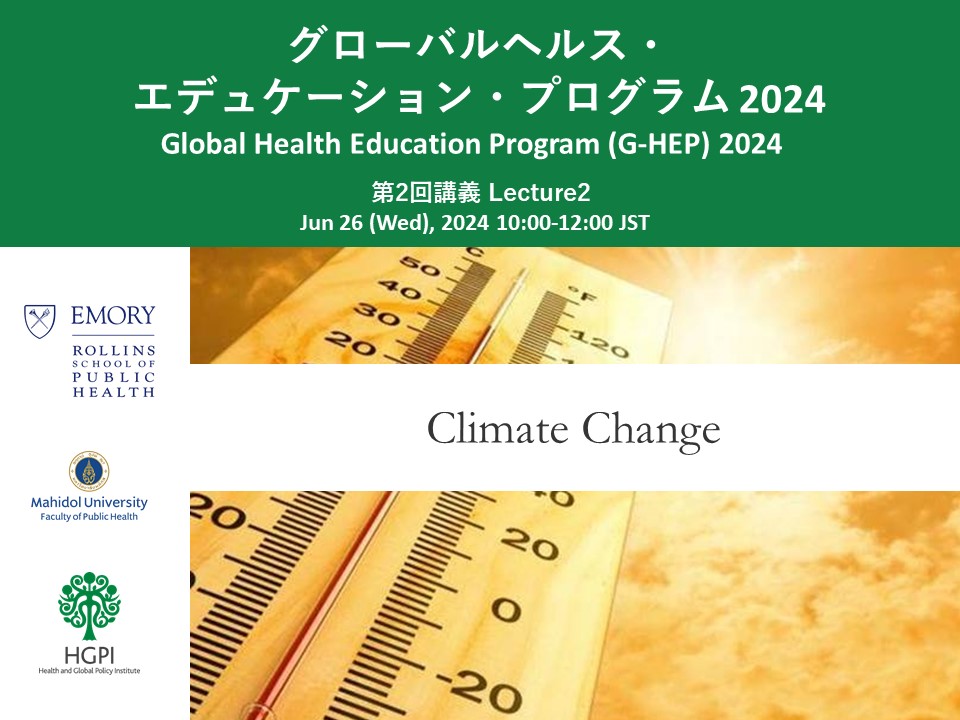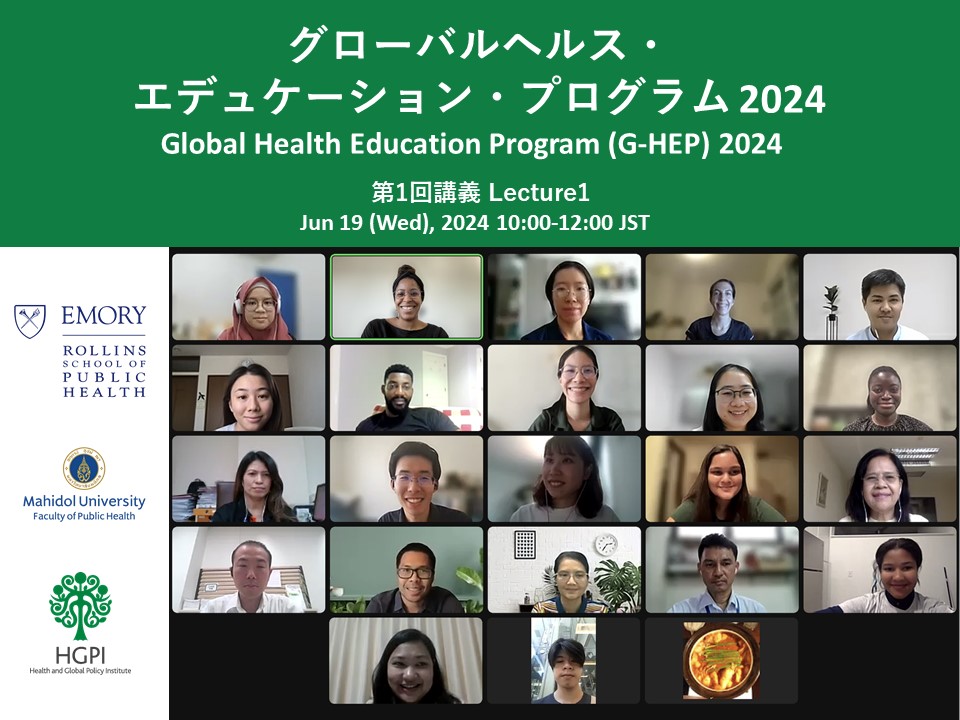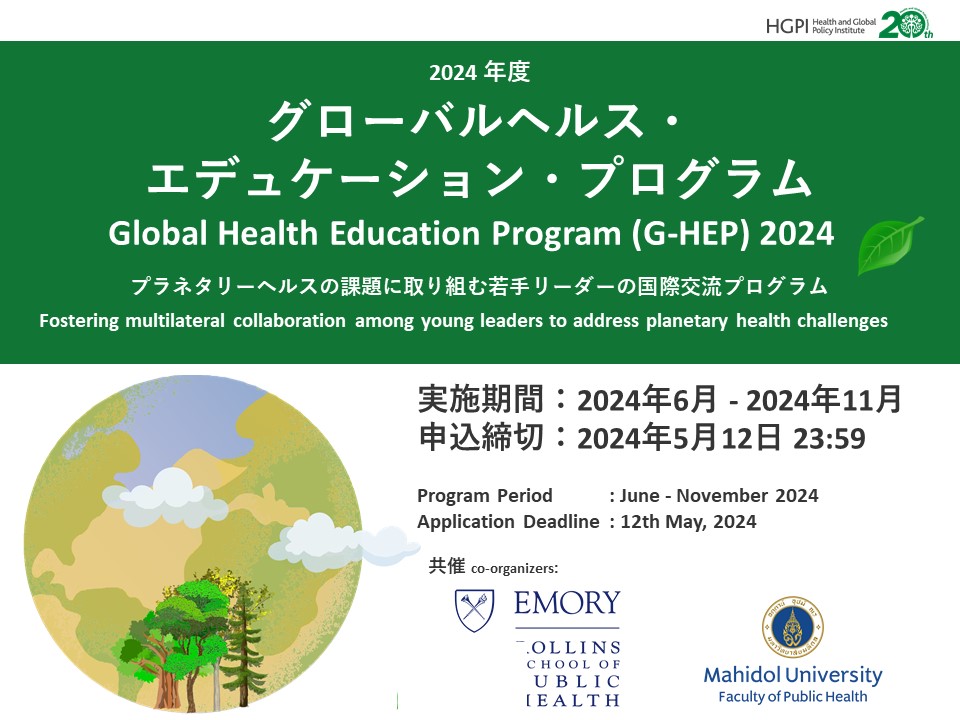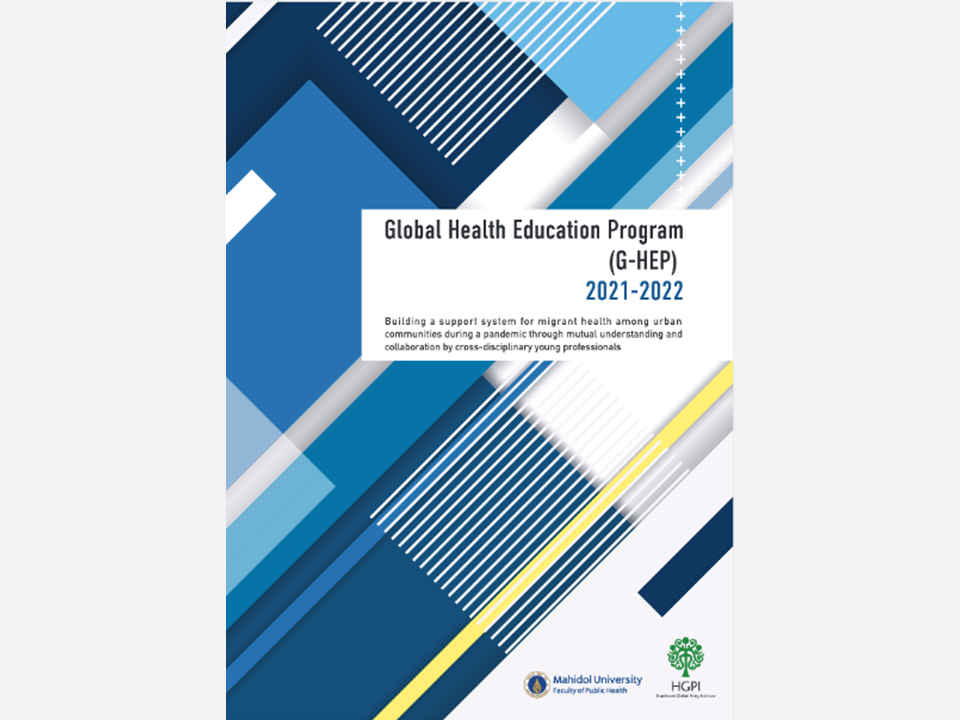[Event Report] Global Health Education Program (G-HEP) 2024 – Lecture 4: Insights from Collaborative Efforts: Practical Steps for Advancing Planetary (July 10, 2024)
date : 8/8/2024
Tags: Global Health, Global Health Human Resources Development
![[Event Report] Global Health Education Program (G-HEP) 2024 – Lecture 4: Insights from Collaborative Efforts: Practical Steps for Advancing Planetary (July 10, 2024)](https://hgpi.org/en/wp-content/uploads/sites/2/HGPI_240710_G-HEPeyecatch.jpg)
The 2024 Global Health Education Program (G-HEP) held its fourth lecture on July 10th.
In this lecture, Mr. Joji Sugawara, Vice President of HGPI, provided a lecture titled “Insights from Collaborative Efforts: Practical Steps for Advancing Planetary”. Mr. Sugawara touched on some of the issues in the field of planetary health, discussing the global ecological footprint and its connection with the environmental problems we are facing worldwide. He then introduced the HGPI Planetary Health Project which was formed to contribute to the promotion of human health and the realization of a more sustainable society by promoting the concept of planetary health through three pillars: (1) climate change; (2) loss of biodiversity; and (3) environmental pollution. Since its inception in 2022, there have been many initiatives from research, expert meetings, symposiums, reports, and policy recommendations. Mr. Sugawara concluded with examples of trends in the policy space on planetary health initiatives throughout the international community and within Japan.
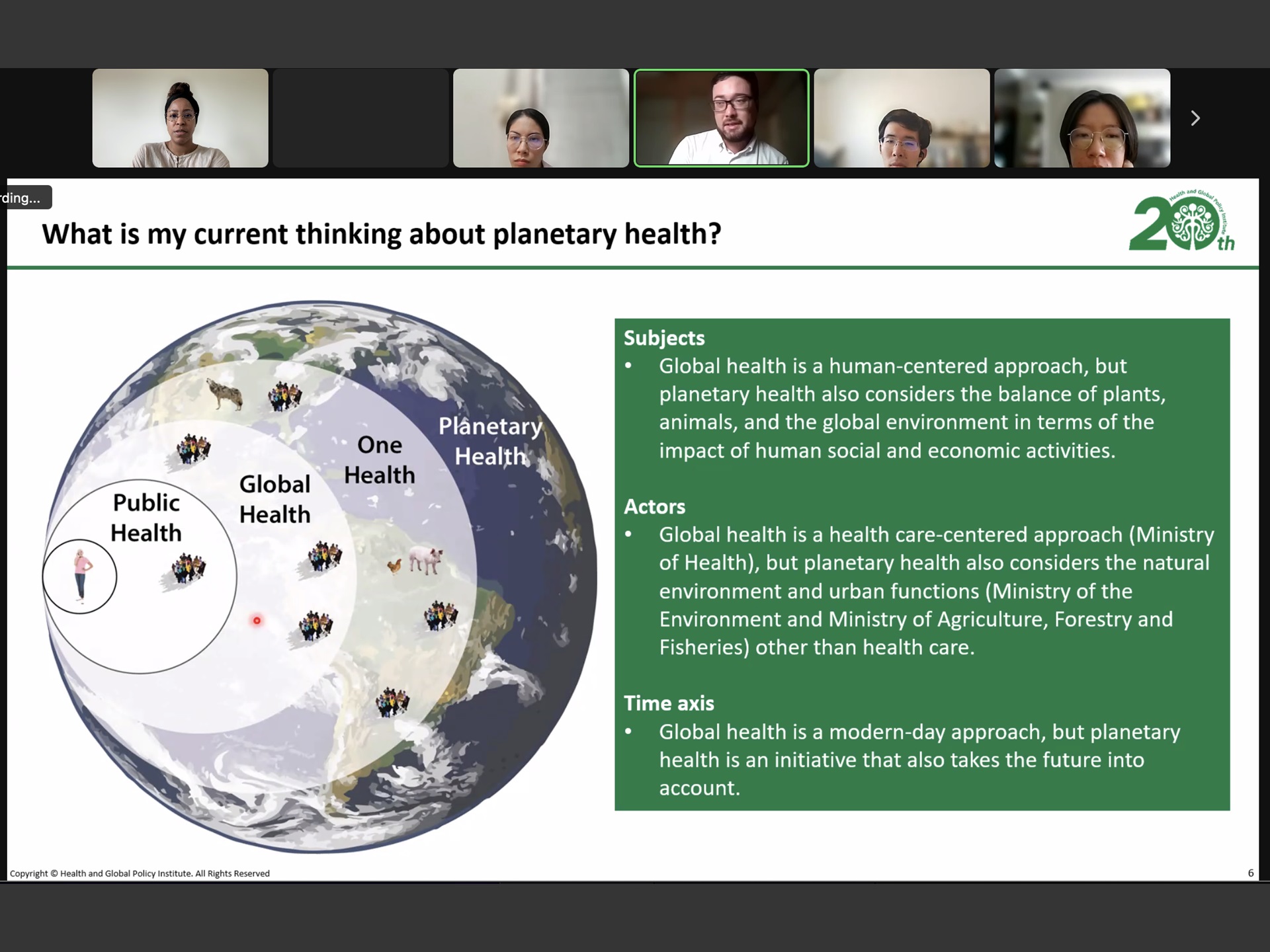
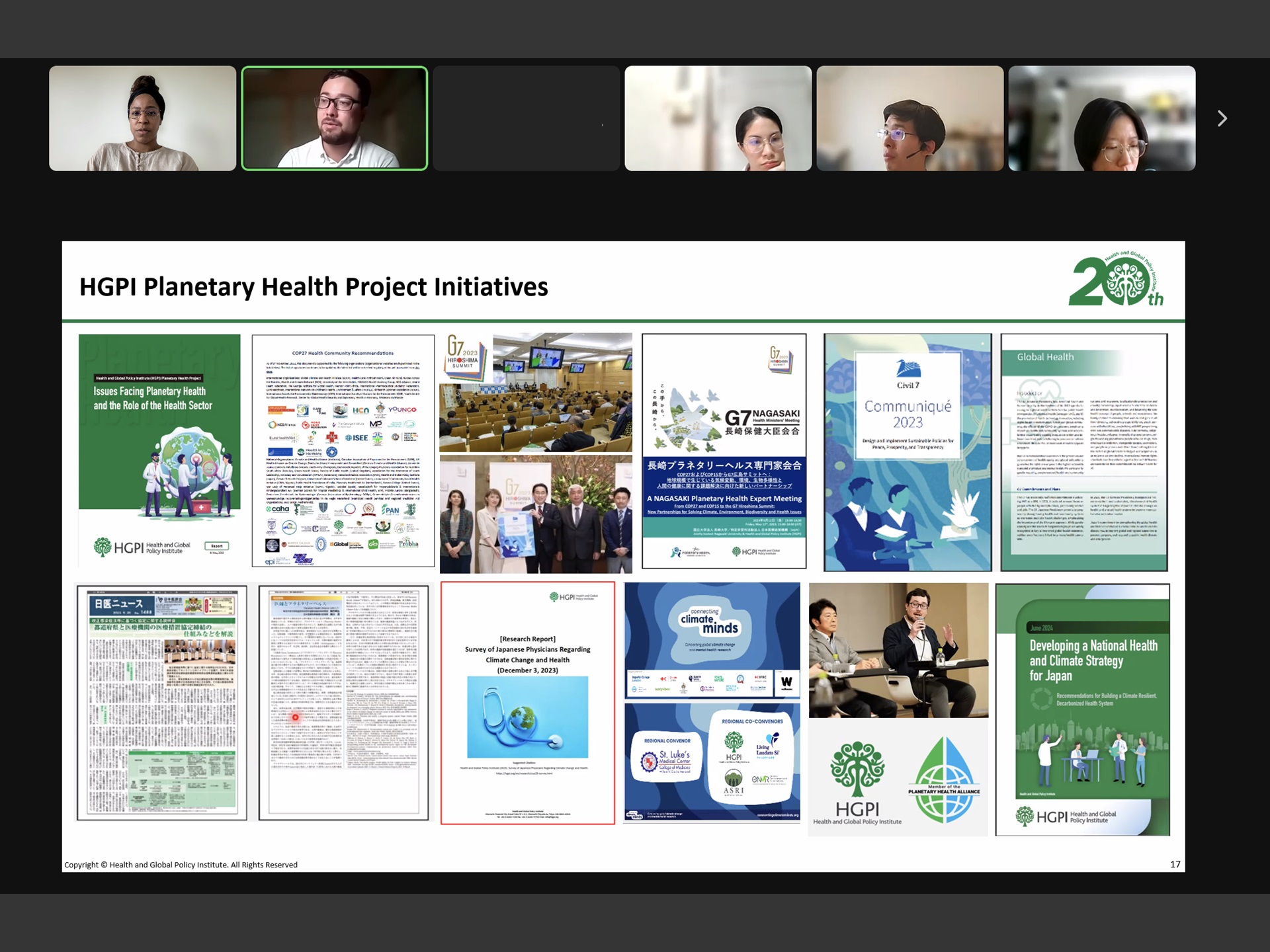
Almost all experts agree that governments play a critical role in the fight against climate change, and international cooperation is more important than ever because no country can address climate change by itself. G-HEP lectures and group work are held online once a week from June through July 2024 to prepare the participants for the subsequent fieldwork phase in Thailand.
■ Lectures
Lecture 1: Introduction to Case Study Topics and Supervisors
Lecture 2: Climate Change: Current Changes in Global Environmental Systems
Lecture 3: Addressing Planetary Health Issues via Multidisciplinary Approach
Lecture 4: Insights from Collaborative Efforts: Practical Steps for Advancing Planetary
■ About Global Health Education Program (G-HEP)
The “Global Health Education Program (G-HEP)” vision is to establish a global community of young leaders that can work together to push global health agendas forward and to conduct human resources training and development for the future. The partnership with the Mahidol University Faculty of Public Health which began in 2018 extended the program’s boundaries through interactions among young generations not only from Japan but from the ASEAN region as well. This year’s program welcomes Emory University Rollins School of Public Health bringing a U.S. perspective to the program along with participants of diverse professions and backgrounds. Participants in G-HEP can work together to deepen mutual understanding and cooperation for solving complex global public health issues.
■ About The Rollins School of Public Health at Emory University
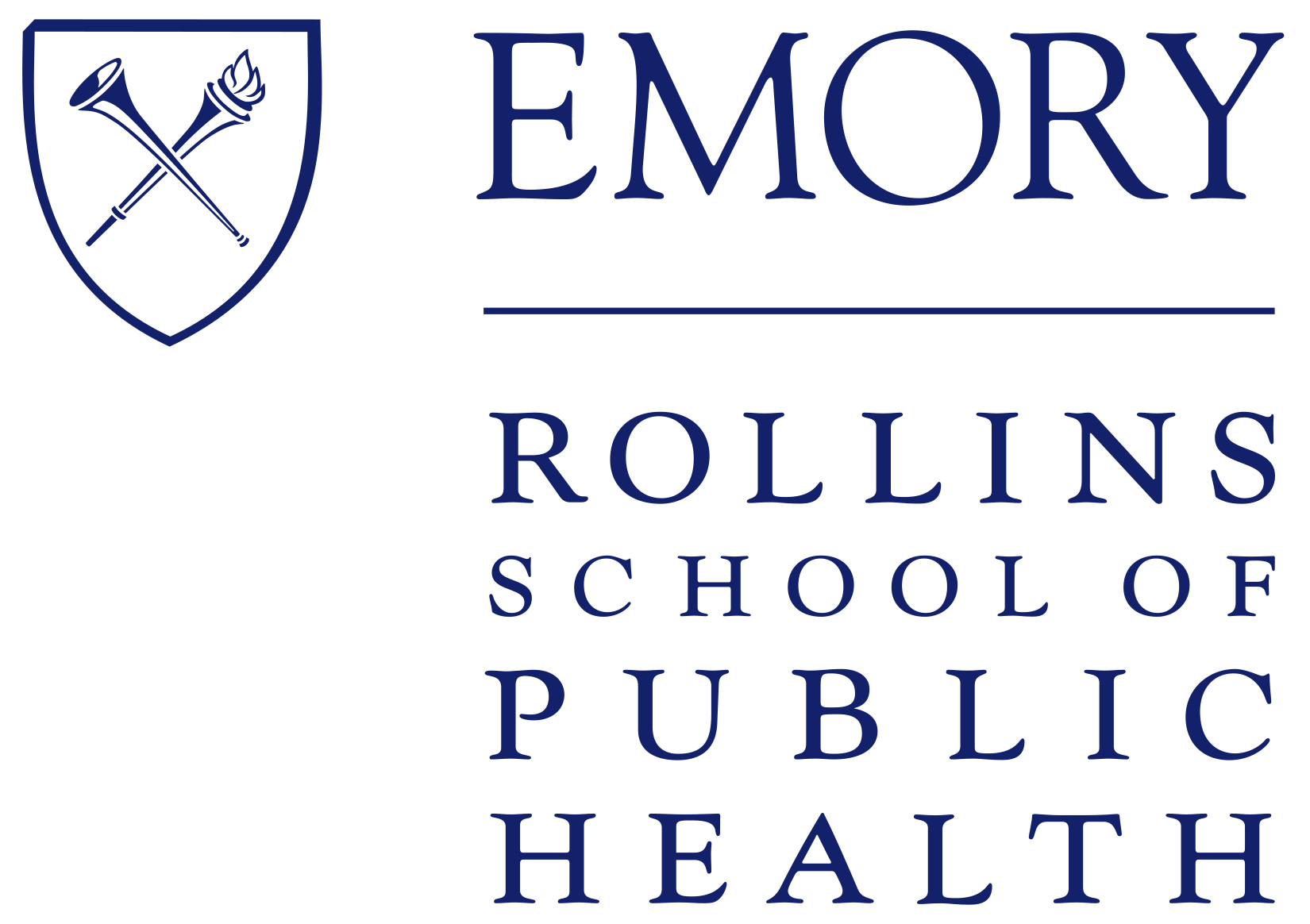 The Rollins School of Public Health at Emory University is ranked 3rd among all accredited schools and programs of public health in the United States. Located in Atlanta, known as the “Public Health Capital of the World,” the school draws strength from several unique local resources. The U.S. Centers for Disease Control and Prevention provides many of the school’s nearly 200 adjunct faculty. The Carter Center is involved in international health intervention programs that provide student practicum opportunities. Students can learn from both in the classroom and as interns in the field. Students join the Rollins community from all 50 states and from more than 40 foreign countries to contribute to the school and apply knowledge to promote health and prevent disease in human populations.
The Rollins School of Public Health at Emory University is ranked 3rd among all accredited schools and programs of public health in the United States. Located in Atlanta, known as the “Public Health Capital of the World,” the school draws strength from several unique local resources. The U.S. Centers for Disease Control and Prevention provides many of the school’s nearly 200 adjunct faculty. The Carter Center is involved in international health intervention programs that provide student practicum opportunities. Students can learn from both in the classroom and as interns in the field. Students join the Rollins community from all 50 states and from more than 40 foreign countries to contribute to the school and apply knowledge to promote health and prevent disease in human populations.
■ About The Faculty of Public Health at Mahidol University
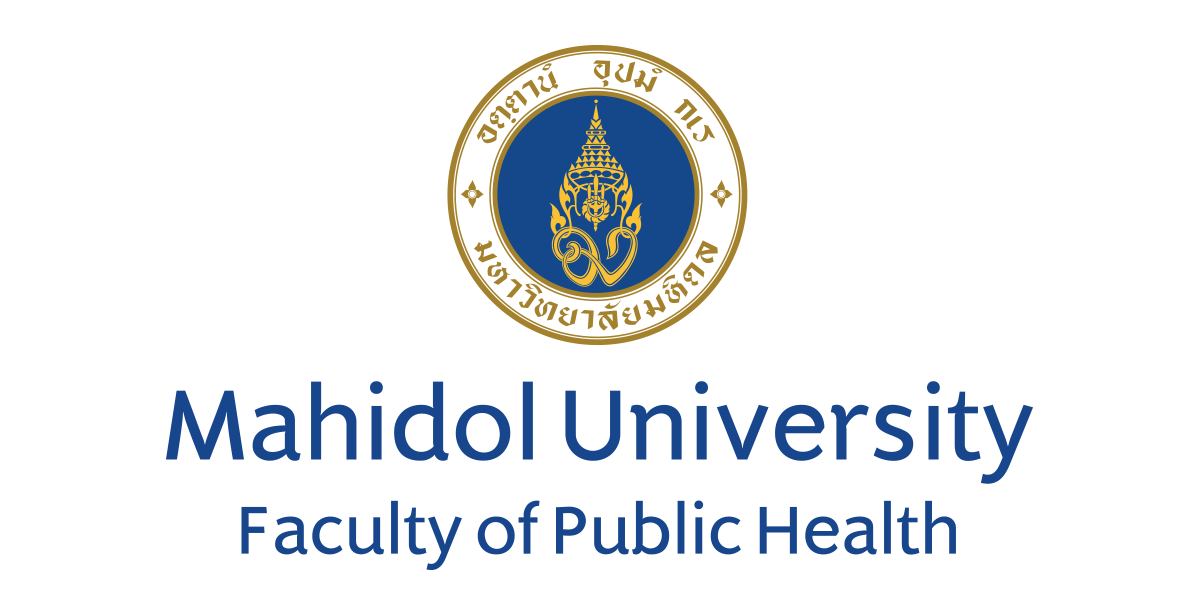 The Faculty of Public Health at Mahidol University, established in 1948 is the first public health academic institution in Thailand. At present, the Faculty of Public Health produces approximately 1,400 graduates in several majors from the Bachelor, Masters, and Doctoral levels. The faculty plays an integral role as an academic leader in the Asia-Pacific region, contributing to the development of the country on academic management, training, as well as academic service to Asia-Pacific countries. Since 1976, the faculty has been running the Master of Public Health – International Program, with over 1250 graduates from 42 different countries.
The Faculty of Public Health at Mahidol University, established in 1948 is the first public health academic institution in Thailand. At present, the Faculty of Public Health produces approximately 1,400 graduates in several majors from the Bachelor, Masters, and Doctoral levels. The faculty plays an integral role as an academic leader in the Asia-Pacific region, contributing to the development of the country on academic management, training, as well as academic service to Asia-Pacific countries. Since 1976, the faculty has been running the Master of Public Health – International Program, with over 1250 graduates from 42 different countries.
This project is supported by The Japan Foundation.
Top Research & Recommendations Posts
- [Research Report] Building a Mental Health Program for Children and Measuring its Effectiveness (June 16, 2022)
- [Research Report] 2019 Survey on Healthcare in Japan
- [Policy Recommendations] Developing a National Health and Climate Strategy for Japan (June 26, 2024)
- [Announcement] A Turning Point Towards Building Green Healthcare Systems (June 5, 2024)
- [Research Report] The 2023 Public Opinion Survey on Satisfaction in Healthcare in Japan and Healthcare Applications of Generative AI (January 11, 2024)
- [Policy Recommendations] Obesity Control Promotion Project 2023 “The Next Steps for Engaging and Cooperating with Patients, Citizens, and Communities for Implements of Obesity Control Measurements” (April 8, 2024)
- [Policy Recommendations] Kidney Disease Control Promotion Project 2023 “Establishing Kidney Disease Control Measures with Patient, Citizen, and Community Engagement and Collaboration” Policy Recommendations, a Collection of Good Practices of Chronic Kidney Disease (CKD) and Control Measures in Local Governments (February 14, 2024)
- [New Report] Policy Priorities for Super-Ageing Japan: Health Innovation and Economic Growth in the COVID-19 Pandemic Era (February 24, 2021)
- [Report and Recommendations] Discussion Points in Healthcare DX Project Expert Panel Meeting (April 2, 2024)
- [Policy Recommendations] Achieving Equity in Multidisciplinary Pain Treatment and Support Systems for Pain Management (March 31, 2023)
Featured Posts
-
2024-10-07
[Registration Open] Planetary Health Expert Meeting “Building the Future of Healthcare: A Vision for Sustainable and Resilient Health Systems with GGHH” (November 5, 2024)
![[Registration Open] Planetary Health Expert Meeting “Building the Future of Healthcare: A Vision for Sustainable and Resilient Health Systems with GGHH” (November 5, 2024)](https://hgpi.org/en/wp-content/uploads/sites/2/ph-20241105-topr2.jpg)
-
2024-10-28
[Registration Open] (Hybrid Format) Public Symposium “Promoting CVD Control Based on the Needs of People Living with or Affected by Cardiovascular Diseases: Towards Effective Implementation of the Second Phase CVD Control Plans” (November 22, 2024)
![[Registration Open] (Hybrid Format) Public Symposium “Promoting CVD Control Based on the Needs of People Living with or Affected by Cardiovascular Diseases: Towards Effective Implementation of the Second Phase CVD Control Plans” (November 22, 2024)](https://hgpi.org/en/wp-content/uploads/sites/2/cvd-ncd-20241122-top.png)
-
2024-10-30
[Event Report] Advisory Board Meeting for Meaningful Involvement Promotion Project “Promoting People with Lived Experience Participation in Policy-Making: Building a Social Foundation for Proactive Engagement” (September 11, 2024)
![[Event Report] Advisory Board Meeting for Meaningful Involvement Promotion Project “Promoting People with Lived Experience Participation in Policy-Making: Building a Social Foundation for Proactive Engagement” (September 11, 2024)](https://hgpi.org/en/wp-content/uploads/sites/2/mip_20240911.jpg)
-
2024-10-31
[HGPI Policy Column] (No.49) From the Mental Health Project ”Changes in the Japanese Mental Health Policy and Future Policy Topics” (The 2nd part ”Issues surrounding long-term hospitalization and future policy topics”)
![[HGPI Policy Column] (No.49) From the Mental Health Project ”Changes in the Japanese Mental Health Policy and Future Policy Topics” (The 2nd part ”Issues surrounding long-term hospitalization and future policy topics”)](https://hgpi.org/en/wp-content/uploads/sites/2/column-49-top.png)




